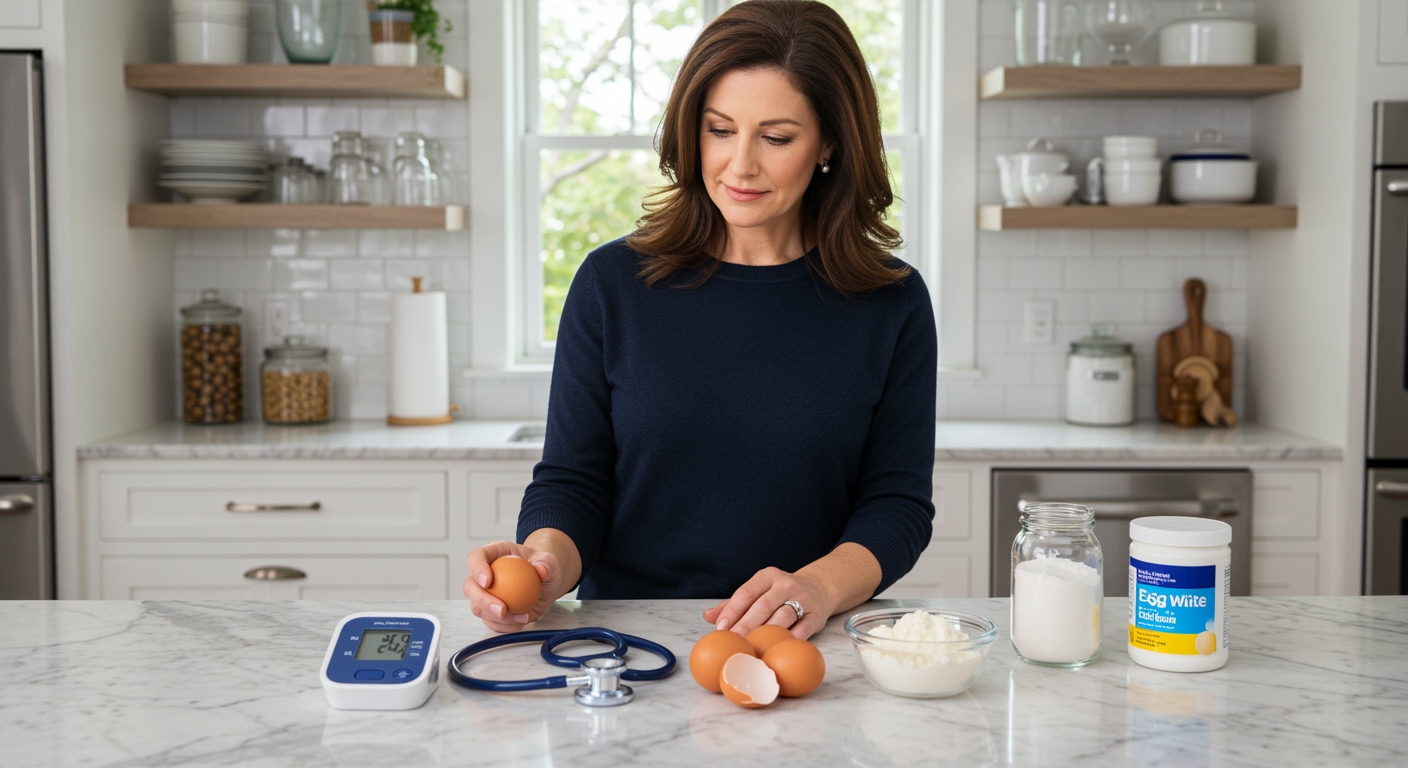✪ Key Takeaway: Eggs can help raise low blood pressure through proteins that support blood vessel function and sodium balance.
Introduction
Your morning eggs might be doing more than filling your stomach.
You probably wonder if eggs can help your low blood pressure because you want natural solutions that actually work. Many people with hypotension struggle to find foods that safely boost their numbers without causing other health problems.
Hi, I’m Abdur, your nutrition coach and today I’m going to explain exactly how eggs can support healthy blood pressure levels and what makes them particularly beneficial for people dealing with hypotension.
How Do Eggs Actually Affect Blood Pressure?
Eggs contain specific proteins that directly influence your cardiovascular system in ways most people never realize.
The egg white proteins work like natural ACE inhibitors, which are compounds that help regulate blood pressure. These proteins prevent certain enzymes from constricting your blood vessels too much. When your vessels stay properly relaxed, your blood pressure maintains healthier levels.
Research shows that people who eat eggs regularly have better blood pressure control compared to those who avoid them completely. The proteins in eggs help your body produce nitric oxide, a molecule that keeps blood vessels flexible and responsive.
Your body also uses the amino acids from eggs to build stronger blood vessel walls. Stronger vessels mean better circulation and more stable pressure readings throughout the day.
The cholesterol in eggs supports hormone production, including hormones that regulate blood pressure. Your adrenal glands need cholesterol to make aldosterone, which helps control sodium and fluid balance in your body.
✪ Fact: Egg whites contain peptides that naturally inhibit enzymes responsible for blood vessel constriction.
What Makes Eggs Different From Other Protein Sources?
Eggs deliver a complete amino acid profile that your cardiovascular system needs for optimal function.
Unlike plant proteins that often lack certain amino acids, eggs provide all nine essential amino acids in perfect ratios. Your body uses these amino acids to repair blood vessel damage and maintain healthy circulation patterns.
The bioavailability of egg proteins exceeds most other food sources, meaning your body absorbs and uses them more efficiently. This higher absorption rate translates to faster cardiovascular benefits compared to other protein sources.
Eggs also contain choline, a nutrient that supports nerve function and helps your heart maintain steady rhythms. Many people with low blood pressure also experience irregular heartbeats, and choline helps stabilize these patterns.
The vitamin D in eggs works with calcium to support proper muscle contractions in your heart and blood vessels. This coordination helps maintain consistent pressure levels throughout your circulatory system.
Most importantly, eggs provide these benefits without the inflammatory compounds found in processed meats or the incomplete proteins found in many plant sources.
✪ Pro Tip: Choose pasture-raised eggs for higher omega-3 content and better cardiovascular benefits.
How Many Eggs Should You Eat For Low Blood Pressure?
The optimal amount depends on your individual health status and other dietary factors you need to consider.
Most research suggests that one to two eggs daily provides cardiovascular benefits without causing negative effects in healthy adults. This amount supplies enough protein to support blood vessel function while avoiding excessive cholesterol intake.
People with severe hypotension might benefit from eating eggs twice daily, especially if they combine them with other blood pressure supporting foods like leafy greens and whole grains.
Your preparation method matters significantly for maximizing benefits. Boiled or poached eggs retain more nutrients compared to fried eggs cooked in processed oils that can cause inflammation.
Timing also influences effectiveness. Eating eggs for breakfast helps stabilize your blood pressure throughout the morning when many people experience their lowest readings.
If you have other health conditions like diabetes or kidney disease, consult your healthcare provider before increasing egg consumption significantly.
✪ Note: Start with one egg daily and monitor your blood pressure response before increasing intake.
What Should You Combine With Eggs For Better Results?
Certain food combinations amplify the blood pressure benefits you get from eggs.
Adding potassium-rich foods like spinach or avocado to your eggs helps balance sodium levels and supports healthy blood pressure. Potassium works directly with the proteins in eggs to improve blood vessel flexibility.
Whole grain toast provides complex carbohydrates that help stabilize blood sugar levels, which indirectly supports steady blood pressure throughout the day.
Including healthy fats like olive oil or nuts enhances the absorption of fat-soluble vitamins from eggs while providing additional cardiovascular protection.
Herbs like garlic and turmeric contain compounds that work synergistically with egg proteins to improve circulation and reduce inflammation in blood vessels.
Avoid combining eggs with high-sodium foods like processed meats or cheese, as excessive sodium can counteract the blood pressure benefits you get from eggs.
Stay hydrated when eating eggs regularly, as adequate fluid intake helps your cardiovascular system use the proteins effectively for blood pressure regulation.
✪ Pro Tip: Pair eggs with leafy greens and whole grains for maximum blood pressure supporting benefits.
The Bottom Line
Eggs can definitely help support healthy blood pressure levels through their unique protein profile and essential nutrients that directly benefit your cardiovascular system.
The best nutrition solutions are often the simplest ones hiding in plain sight on your kitchen counter. When you choose whole foods like eggs over processed alternatives, you give your body the tools it needs to maintain optimal health naturally.
I would love to hear about your experience with eggs and blood pressure in the comments below. Have you noticed any changes in your readings after including more eggs in your diet, or do you have questions about the best ways to prepare them for maximum benefits?
References
At NutritionCrown, we use quality and credible sources to ensure our content is accurate and trustworthy. Below are the sources referenced in creating this article:





